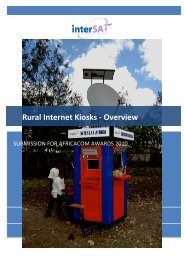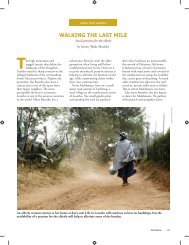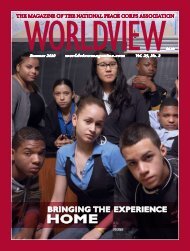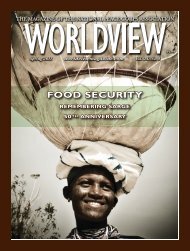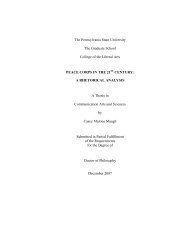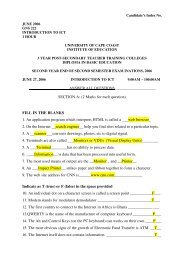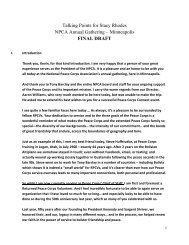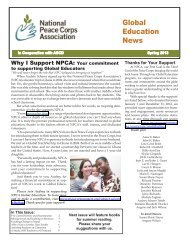Group Education Manual - Peace Corps Wiki
Group Education Manual - Peace Corps Wiki
Group Education Manual - Peace Corps Wiki
Create successful ePaper yourself
Turn your PDF publications into a flip-book with our unique Google optimized e-Paper software.
ClosingNowadays, with advances in medicine and pharmacological resources and a greaterunderstanding of HIV/AIDS itself, the quality of life of people with HIV/AIDShas increased considerably. This means that PLWHAs can live lives that are similarto the rest of society. For example, they can continue to date, marry, have an activesexual life, bear children, and work.However, PLWHAs often suffer prejudice and discrimination in society and requirespecial health treatments and medications. Above all, they require and want respectand dignity. There are more and more people who have been infected for a longtime and who lead active and productive lives (try to find examples in yourcommunity, country, or region.). They are proof that a life with HIV/AIDS is notone that is “over,” but rather one that “continues.” To this end, it is fundamentalthat you and other people do your part to help build a community that is just andsupportive of all people, including those living with HIV/AIDS.Women are more heavily affected by HIV/AIDS than men. The health care offamily members is only one of women’s many responsibilities . This care is free, butit has a cost! If they are ill themselves or caring for ill people, women cannot dotheir other work. This has a serious impact on the long term well-being of thehousehold. Women bear a burden of guilt, fearing the possibly of infecting theirchildren. Living with the discrimination and stigma increases stress. Care does notend with the death of the person with AIDS. Women are often blamed for nothaving cared for the husband enough. Some are even accused of being a witch.Care of orphans fall on grandmothers and aunts. Women caregivers are often HIVpositivethemselves.Gender roles affect the way men deal with HIV/AIDS. Gender roles can harmthe health and well-being of men living with HIV. Research has shown that menchoose not to get involved in care and support activities because of fears of beingridiculed for doing women’s work. 26 Similarly, gender roles encourage men to viewseeking help as a sign of weakness. This prevents men from seeking counseling andsupport when they are infected and/or ill. This belief also prevents men fromsupporting each other in dealing with HIV/AIDS. These same gender roles alsoincrease the likelihood that men might use alcohol, drugs, or sex to ease feelings ofdespair and fear.Men can play a greater role in reducing the impact of HIV/AIDS. We needto help and challenge men to get more involved in care and support activities. Mencan also talk with the women in their lives about sharing the tasks in the family orhousehold more equally. This would reduce the burden on women. Men have acritical role to play in supporting other men to deal with HIV/AIDS, bothemotionally and practically.26 For instance, in a 1998 UNAIDS study, the authors revealed that in Kyela, Tanzania “male heads of households would wish to domore when their partners fell ill but were curtailed by cultural definitions of maleness and the roles defined which determinemasculinity.” Aggleton, P., & Warwick, I. 1998. A comparative analysis of findings from multisite studies of household and community responses toHIV and AIDS in developing countries. UNAIDS: Geneva.60




